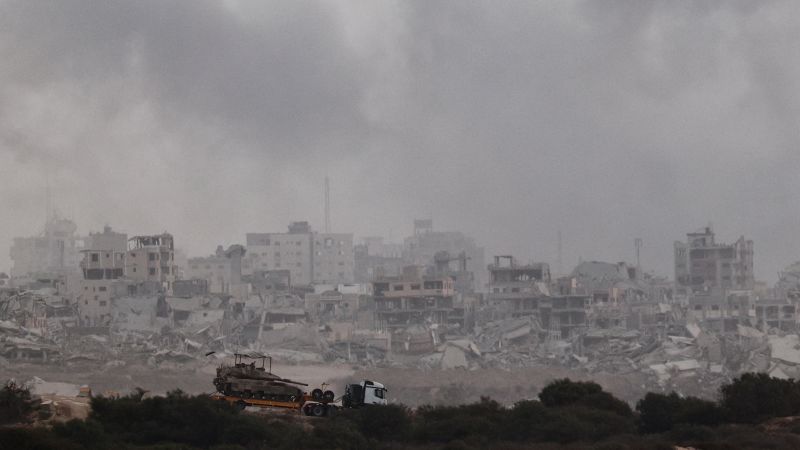
The devastation of Israel’s war in Gaza has been further shown in statistics published by the UN agency for Palestinian refugees on the eve of the conflict’s second anniversary.
More than 66,000 Palestinians – including over 18,000 children – have been killed in Gaza since October 7, 2023, according to a factsheet from the UN Relief and Works Agency for Palestine Refugees (UNRWA).
Gaza’s health ministry reported a higher figure on Saturday of more than 67,000, and nearly 170,000 others wounded.
Other key figures highlighted by the UN factsheet include:
Nearly all of Gaza’s residents have been displaced, many multiple times.
Nearly 80% of structures have been damaged or destroyed across Gaza, and over 98% of cropland has been damaged, made inaccessible, or both.
There have been 455 malnutrition-related deaths, including over 150 children.
Over 790 attacks have been recorded on health workers, patients, hospitals and other medical facilities.
Nearly 660,000 children have been forced out of school for the third consecutive year and almost 92% of schools are in need of major repairs or full reconstruction.
Nearly 90% of Gaza’s water sanitation and hygiene resources have been destroyed and more than two in five families are living near uncollected waste.
Half a million women and girls lack menstrual hygiene products, and more than 60% of homes lack access to soap.
Some context: An independent UN inquiry concluded for the first time in September that Israel had committed genocide against Palestinians in Gaza, a finding that echoes those of other genocide experts and human rights groups.
The Israeli government has maintained it is conducting the war in Gaza in self-defense and in accordance with international law, firmly rejecting all accusations of genocide, restricting aid into Gaza and child malnutrition.
A flurry of Middle East diplomacy unfolded this weekend, as Israel and Hamas signaled willingness to move forward on President Donald Trump’s 20-point Israel-Hamas ceasefire proposal.
Today, negotiators are set to meet in Egypt for ceasefire talks. Israel has accepted Trump’s proposal, while Hamas has partly agreed.
We also heard from Palestinians in Gaza. They voiced tempered optimism about a truce but said Israeli strikes are still devastating the enclave.
Here’s a roundup of key headlines:
• Who will attend the talks? Negotiators from the US, Israel and Hamas will take part in indirect talks between Israel and the militant group, sources told CNN. Israel said its delegation is leaving for Egypt today, but that the team will be led remotely by the country’s minister of strategic affairs. Hamas’ delegation is headed by chief negotiator Khalil Al-Hayya, who was seen in a video for the first time since Israel’s assassination attempt in Doha.
• Trump’s perspective: Trump said that Hamas faces “obliteration” if it refuses to cede power in Gaza. But he was also upbeat on the prospect of striking a deal, saying he expects negotiations to take “a couple of days” and was told the first phase would be completed this week.
• On the ground in Gaza: Some Palestinians noted a decrease in the intensity of Israeli strikes yesterday, after Trump claimed Israel had temporarily stopped bombing the enclave. But Gaza hospitals said at least 15 more people were killed Sunday and dozens of others were killed Saturday by Israeli strikes.
• Flotilla detainees deported: Twenty-one detainees landed in Madrid, Spain, yesterday. The last 15 Italians remaining in Israel from the intercepted Global Sumud flotilla will be sent to Italy today. Israel’s interception of the flotilla, which was attempting to deliver supplies to civilians in Gaza, sparked protests around the world.
A group of activists and politicians deported from Israel for being part of an aid flotilla to Gaza expressed their fears for their fellow activists still in Israel after arriving in Spain, according to Reuters.
Twenty-one mainly Spanish detainees landed in Madrid on Sunday and were seen hugging relieved relatives and supporters in video published by the news agency.
Goretti Sarasibar, one of the returning activists, told Reuters the group was released from their cells in the morning and taken to a yard where they were forced to watch images of the October 7, 2023, Hamas attack on Israel.
“Now we are super happy eating, as we were starving,” he said. “They didn’t give us food all day.”
Fellow deportee Rafael Borrego showed the handcuff marks on his wrists and described the jail conditions in a Reuters video.
Juan Bordera, a Spanish lawmaker and activist, said “we fear” for the remaining prisoners, echoing previous reports of harrowing conditions at the jail such as “rotten food,” undrinkable water and beatings with some prisoners resorting to hunger strikes.
Dutch activist Marco Tesh added:
They were among the 437 activists, including Greta Thunberg, arrested last week aboard the Global Sumud flotilla, a coalition of more than 40 humanitarian aid vessels.
Responding to earlier reports the activists had been mistreated, Israel’s foreign ministry said the claims were “brazen lies.”